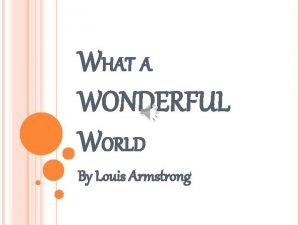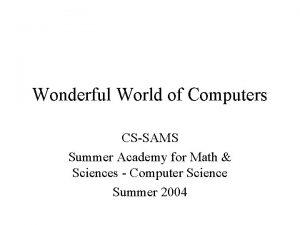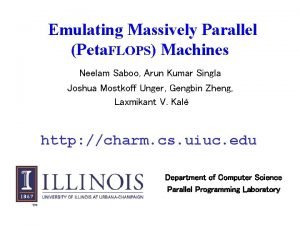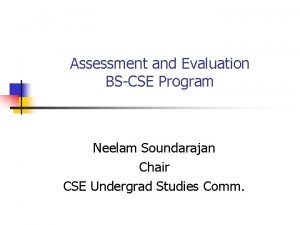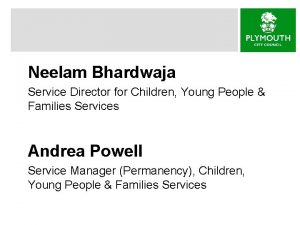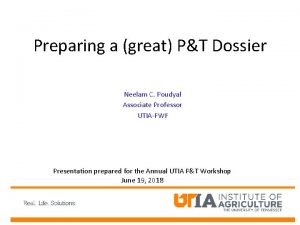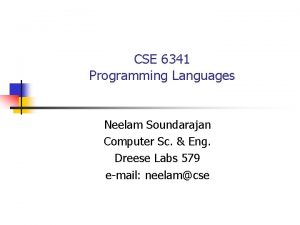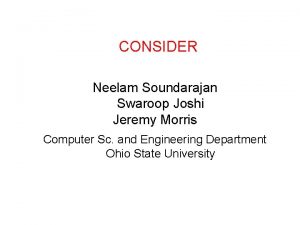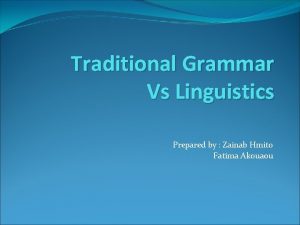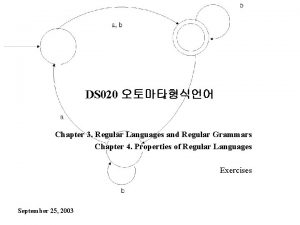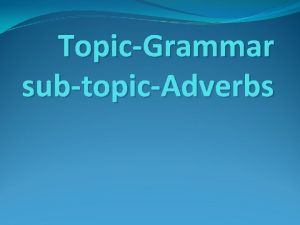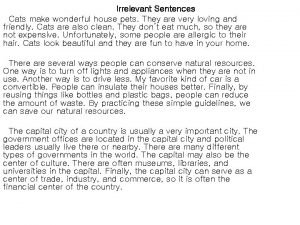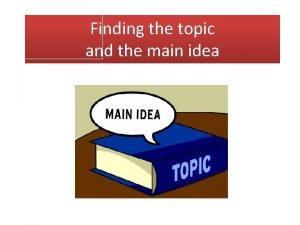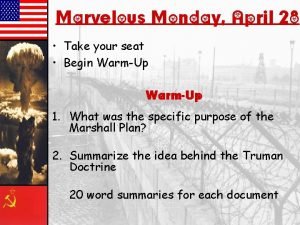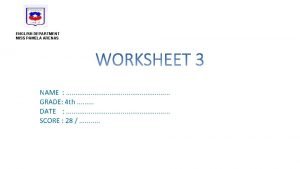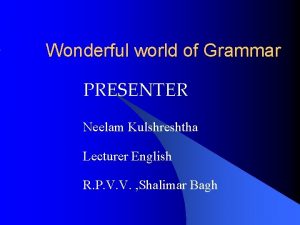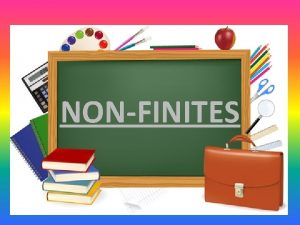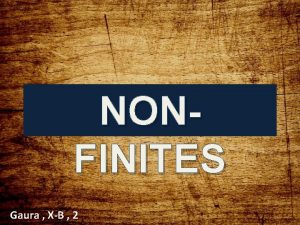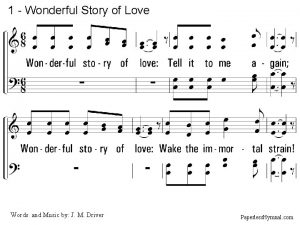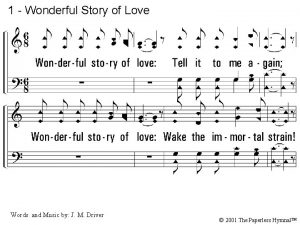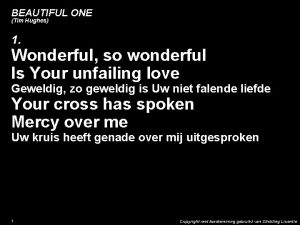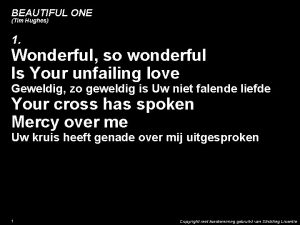Wonderful world of Grammar Presenter Neelam Kulshreshtha NONFINITES









































- Slides: 41

Wonderful world of Grammar Presenter Neelam Kulshreshtha

NON-FINITES l Mr. Beans wants to hide a toy. l Micky mouse stole the cake. l Champu answered the questions. l The elephants love swimming. l The baby enjoys bathing in the tub. l John wants to play Hockey. l Sonu Nigam loves singing l Songs.


The underlined verbs are controlled by q Time or tense q Person (of the Subject) q Number (of the Subject)

NOTICE THE CHANGE l The boys wants to hide a toy. l Micky mouse stole the cake. l Champu answered the questions. l The elephant love swimming. l The babies enjoys bathing in the tub. l The players wants to play Hockey. documents) here l Singers loves singing l Songs.

A plural subject requires plural verb. A singular requires singular verb. l. The relation between the subject and its verb is one of interdepend ence.

Kind of verbs :

EXAMPLES OF NON-FINITES l The children decide to play football. l The teacher decides to play games in the class. l Sonu enjoys singing songs. l My friends enjoy singing songs. l I want to run away from here. l Abhishek wants to run from here.

The relation between the subject and a Non-finite verb is one of independence l Non-finites are not limited by : l Tense l Person l number

Kinds of Non-finites: l. INFINITIVES l. GERUND l. PARTICIPLES

INFINITIVES : STRUCTURE

Full Infinitives: l She likes to dance with me. l I want to write a letter to the President of India. l. To +verb (first form)

Bare INFINITIVES Let me dance in the kitchen. Would you dance with me ? i saw him cross the road. I watched the ship sink. Verb without TO. .

FACTS about INFINITIVES: l They take ‘TO’ Before the verb. l They show purpose. l They follow the main verb. l They show purpose. l They function as Noun/

USES OF INFINITIVES l An Infinitive can be used as a subject in a sentence: l To smoke in public is not good. l To err is human. l To lean out of the bus is dangerous.

A N Infinitive can be used as Object l. To see is to believe. l. He seems to know the secret.

The Infinitive can show Purpose. l. I sent Ali to market to buy books l. Shyam has to educate his daughters. l. Mohini learnt English to impress others.

The infinitives can connect two clauses: l. Billu hurried to school only to find that the school was closed. l He survived in the cash only to die in the desert.

Verbs followed by Infinitives: advise Allow bribe Command compel enable feel implore Instruct , invite Order Oblige Request train warn Tell teach watch entitle

The INFINITIVES AFTER TOO, ENOUGH l He was too drunk to drive home. l The grass was too wet to sit on. l Mamta is too weak to walk. l Rajan is too dull to understand this.

With enough l He is rich enough to buy a new car daily. l Ali is strong enough to lift the box l The teacher is strict enough to give tpunishment. l The ice was thick enough to walk on.

Combine each of the following pairs of sentences into one sentenceusing tooenough: l l l l l You are very young. you can’t have a front door key. Its very cold. We can’t bathe. I am rather old. I cant wear that kind of hat The ladder wasn’t very long. It didn’t reach the window Tom was very foolish. He told lies to the police The river is deep. We cant wade it He is lazy. He wont get up early The ice is quite thick. We can walk on it. He was very drunk. He couldn’t answer my question. It was very hot. You could fry an egg on the pavement.

Let’s work together : combine the following sestences by using an Infinitive: Everyone should do his duty. The country expects this of everyone. b. He took out the knife. His object was to stab the man. c. He works hard. He wants to earn his living. d. He must apologize to me. This is the only way to escape imprisonment. a.

Answers: a. . The country expects everyone. To do his duty b. He took out the knife to stab the man. c. He works hard to earn his living. d. He must apologize to me to escape imprisonment.

. She visits the poor. It is in this way that she can help me. f. He has many children. He must provide for them. g. I speak the truth. I am not afraid of it. h. Kanta is a brilliant girl. She will get the first position.

She visits the poor to help me. f. He has many children to provide for them. g. I am not afraid to speak the truth. h. Kanta is a brilliant girl to get the first position.

The bare infinitives: l The bare infinitives are to be used after the expressions like: Can , do, may , must, shall He can go home now. The child can use the dust bin. Ayush may play chess.

FEEL , HEAR , SEE and WATCH and MAKE

l. I saw the elephant dance. l He watched the child play in water. l I heard him sing a sweet song. He watched her drive off. I made him move my car.

With WOULD RATHER, , RATHER, HAD BETTER , HELP l. I’d rather wait till tomorrow. l. You had better start at once. l. He helped us push the vehicle.

Gerund l Mohan enjoys eating ice cream. l The children love playing games. l There is no point in waiting. l I am sorry for using your pen. l I am tired of listening to the same singer. l What can I do for you besides typing.

Gerund: its structure: l Verb +ing l It has the force of a Noun. l Basically it is a verb. l It is also known as verbal noun. l EXAMPLES: EATING, PLAYING, LISTENING, SINGING, TYPING WAITING

USES OF GERUND: Can be used as a --l SUBJECT l Swimming is a good exercise. Learning English is a great fun. laughing loudly de-stresses us.

As object to a verb: l He is fond of hunting. l Meena enjoys dancing. l My mother loves cooking. l The children hate sitting inside the house.

Gerund as a complement: l My hobby is painting. l I don’t like his talking to her. l Seeing is believing. l Amit ‘s hobby is playing music.

Verbs followed by the Gerund: l Admit , anticipate, appreciate, avoid , consider, delay deny, dread enjoy, escape enjoy , forgive imagine, keep mind , miss, pardon, postpone, l Remember, risk , stop, suggest

Gerunds used as slogans: l. No smoking. l. No parking here. l. No fishing. l. No crossing.

Verbs which may take either an Infinitive or Gerund l. Advise , agree , allow , begin , continue , forget , hate , like , love , mean , need , permit. prefer , propose , regret , remember, stop try , start

Participle: its structure l Present participle -----verb +ing l Past participle-----third form of the verb l It functions as ADJECTIVE. l EXAMPLES: l I saw the balloon rising. l He gave me a broken chair. l She gave me boiled eggs in the breakfast.

NOTICE THESE SENTENCES: l Mohan has broken a chair. l Amit was sitting on a broken chair. l Rita has boiled the eggs. l I Take boiled eggs in the breakfast. l I have lost my mobile phone. l The lost book was recovered from the dustbin.

Fill in the blanks with Non-finites: l It has been decided -----(build) a number of Fly -overs in Delhi. That would mean -----(cut )hundreds of trees. It would create ecological imbalance. l To build, cutting
 Analogy between electric and magnetic circuits
Analogy between electric and magnetic circuits Wonderful so wonderful is your unfailing love
Wonderful so wonderful is your unfailing love Wonderful wonderful jesus
Wonderful wonderful jesus Laugh
Laugh Dynamics of what a wonderful world
Dynamics of what a wonderful world Literary devices in what a wonderful world
Literary devices in what a wonderful world Quaver marvelous world
Quaver marvelous world The wonderful world of computers
The wonderful world of computers Marasmius haematocephalus
Marasmius haematocephalus Wonderful world meme
Wonderful world meme Peta flops
Peta flops Neelam soundarajan
Neelam soundarajan Neelam fida
Neelam fida Neelam bhardwaja
Neelam bhardwaja Neelam poudyal
Neelam poudyal Neelam soundarajan
Neelam soundarajan Neelam soundarajan
Neelam soundarajan Neelam ali
Neelam ali Define left linear grammar
Define left linear grammar Characteristics of traditional grammar
Characteristics of traditional grammar Chomsky hierarchy
Chomsky hierarchy Right linear grammar
Right linear grammar Is proudly a adverb
Is proudly a adverb The wonderful name of jesus
The wonderful name of jesus Wonderful characteristics rhyming
Wonderful characteristics rhyming Cats make wonderful house pets
Cats make wonderful house pets Oh how marvelous
Oh how marvelous God loves you and has a wonderful plan for your life
God loves you and has a wonderful plan for your life Adverb of time
Adverb of time Summer is a wonderful time to spend at west beach
Summer is a wonderful time to spend at west beach Invention imitate nature
Invention imitate nature I hope you had a good summer vacation
I hope you had a good summer vacation Mary o'neill poet image
Mary o'neill poet image Wonderful jesus bright morning star
Wonderful jesus bright morning star Thank you for the wonderful performance
Thank you for the wonderful performance He hideth my soul
He hideth my soul Linking words song
Linking words song Wonderful grace
Wonderful grace Marvelous monday terrific tuesday wonderful wednesday
Marvelous monday terrific tuesday wonderful wednesday Isnt the love of jesus something wonderful
Isnt the love of jesus something wonderful Pamela arenas
Pamela arenas What a wonderful change in my life
What a wonderful change in my life




